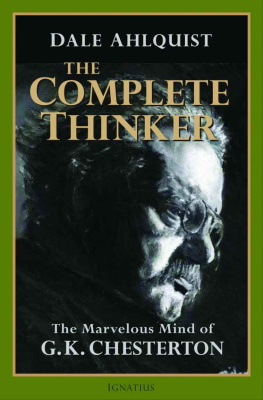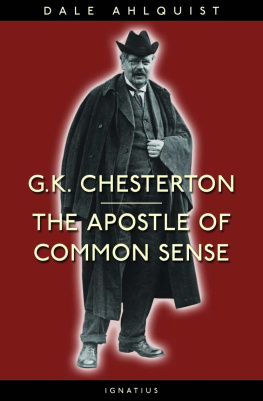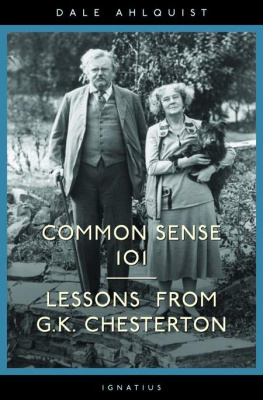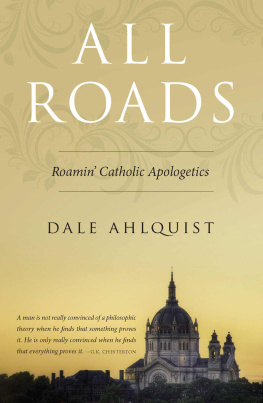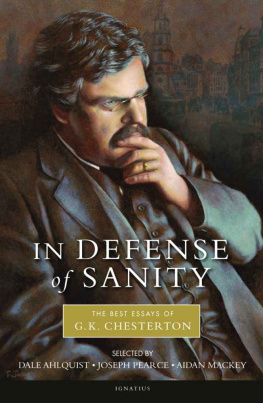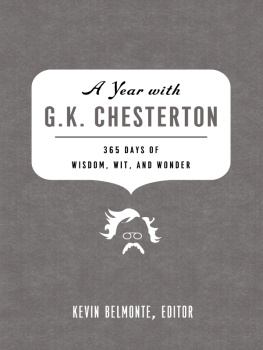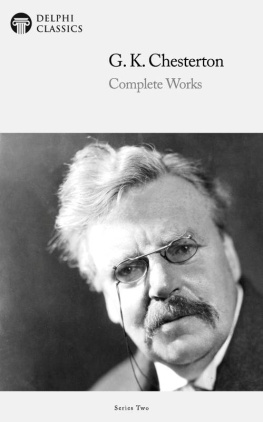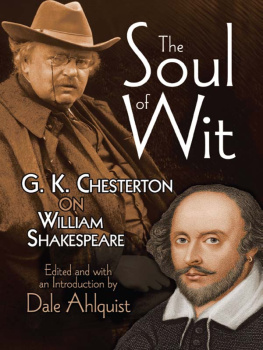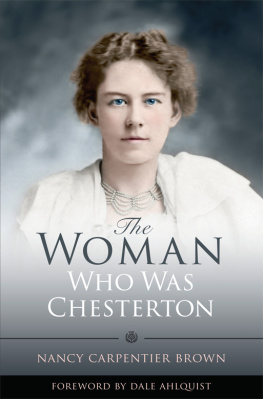Dale Ahlquist - The Complete Thinker: The Marvelous Mind of G.K. Chesterton
Here you can read online Dale Ahlquist - The Complete Thinker: The Marvelous Mind of G.K. Chesterton full text of the book (entire story) in english for free. Download pdf and epub, get meaning, cover and reviews about this ebook. year: 2012, publisher: Ignatius Press, genre: Art. Description of the work, (preface) as well as reviews are available. Best literature library LitArk.com created for fans of good reading and offers a wide selection of genres:
Romance novel
Science fiction
Adventure
Detective
Science
History
Home and family
Prose
Art
Politics
Computer
Non-fiction
Religion
Business
Children
Humor
Choose a favorite category and find really read worthwhile books. Enjoy immersion in the world of imagination, feel the emotions of the characters or learn something new for yourself, make an fascinating discovery.
- Book:The Complete Thinker: The Marvelous Mind of G.K. Chesterton
- Author:
- Publisher:Ignatius Press
- Genre:
- Year:2012
- Rating:3 / 5
- Favourites:Add to favourites
- Your mark:
- 60
- 1
- 2
- 3
- 4
- 5
The Complete Thinker: The Marvelous Mind of G.K. Chesterton: summary, description and annotation
We offer to read an annotation, description, summary or preface (depends on what the author of the book "The Complete Thinker: The Marvelous Mind of G.K. Chesterton" wrote himself). If you haven't found the necessary information about the book — write in the comments, we will try to find it.
The Complete Thinker: The Marvelous Mind of G.K. Chesterton — read online for free the complete book (whole text) full work
Below is the text of the book, divided by pages. System saving the place of the last page read, allows you to conveniently read the book "The Complete Thinker: The Marvelous Mind of G.K. Chesterton" online for free, without having to search again every time where you left off. Put a bookmark, and you can go to the page where you finished reading at any time.
Font size:
Interval:
Bookmark:
DALE AHLQUIST
THINKER
The Marvelous Mind of G. K. Chesterton
IGNATIUS PRESS SAN FRANCISCO
Cover illustration by Ellen Price
Cover design by Riz Boncan Marsella
2012 by Ignatius Press, San Francisco
All rights reserved
ISBN 978-1-58617-675-4
Library of Congress Control Number 2012933884
Printed in the United States of America
To the students of Chesterton Academy, who were once only a figment of my imagination but are now my walking, talking, breathing, living inspiration.
Special thanks to the following fine folks for helping make this book happen: my wonderful wife, Laura, who has to read everything I write and is the only critic I care about; Stephen Beaumont, Chuck Chalberg, Kevin OBrien, and the mighty crew at the Eternal Word Television Network (EWTN), who have helped make Chesterton come alive for millions; Peter Floriani, who has made my life and work easier, and who is also a complete thinker; Geir Hasnes, who keeps helping me find more Chesterton, and who is also a complete thinker; the editors, staff, and contributors to Gilbert Magazine , for offering a few good insights while cranking out the best magazine in the world; and the late great couple Frank and Ann Petta, for their unending encouragement and kindness. God rest their sweet souls.
The Only Man I Regularly Read
I like to read myself to sleep in Bed,
A thing that every honest man has done
At one time or another, it is said,
But not as something in the usual run;
Now I from ten years old to forty one
Have never missed a night: and what I need
To buck me up is Gilbert Chesterton,
(The only man I regularly read).
The Illustrated London News is wed
To letter press as stodgy as a bun,
The Daily News might just as well be dead,
The Idler has a tawdry kind of fun,
The Speaker is a sort of Sally Lunn,
The World is like a small unpleasant weed;
I take them all because of Chesterton,
(The only man I regularly read).
The memories of the Duke of Beachy Head,
The memoirs of Lord Hildebrand (his son)
Are things I could have written on my head,
So are the memories of the Comte de Mun,
And as for novels written by the ton,
Id burn the bloody lot! I know the Breed!
And get me back to be with Chesterton
(The only man I regularly read).
Prince, have you read a book called Thoughts upon
The Ethos of the Athanasian Creed?
No matterit is not by Chesterton
(The only man I regularly read).
Hilaire Belloc
I am sometimes asked if I ever read anything besides G. K. Chesterton. The answer, unfortunately, is yes. I wish I had a better answersomething more along the lines of no. It would save me a lot of time and frustration if I did not have to read other authors.
I am reminded of the warning in Ecclesiastes: My son, beware of anything beyond these. Of making many books there is no end, and much study is a weariness of the flesh. we are immediately delighted with its truth, but we are also pleased by the package it arrives in. A book-length treatise of the topic of rights would not only be more painful and tiresome to read; it would probably never get to such a clear and clean conclusion. This explains why I have been afflicted along with many others who, after they have read Chesterton, are suddenly struck with a strange lack of desire to read anybody else. As one fellow sufferer said to me, Chesterton sort of ruins other authors.
What is it that sets Chesterton apart, besides the fact that he is totally quotable? For one thing, he differs from some other outstanding literary figures of the last century in that he answers questions instead of just asking them. There are some fine artisans of the written word, skilled evokers of stirring and striking images, but their ideas are often disconnected, detached, and even decayeda wilt that is lovely but suggests a lack of rootedness. Or, to switch metaphors, the fog they are lost in is sometimes interesting and eloquent, but it is still a fog and they are still lost in it. They express the problem very wellthey write of the dilemma articulatelybut they cannot find their way out. They do not have a solution. Their suggestiveness can only suggest.
But G. K. Chesterton is enormously clarifying. In an age of relativism, he speaks in absolutes. He speaks the truth without uncertainty, without wavering, and without embarrassmentand without the anger and pride that can befoul even the truth. He speaks with graciousness and goodness and humility. His epigrams ring with an instantly recognizable truth. But he does not merely sprinkle little encapsulated truths; he gushes with an ocean of truth. It is the whole truth. It is a comfort to most, a curiosity to some, and a curse to a few, but no honest reader can shake off the notion that Chesterton is consistently, extensively, and astonishingly right in what he writes.
And he writes about everything. I have been reading and studying and exploring Chestertons writings for thirty years. He wrote more than just about any other writer in history, and I have read (and reread) most of it (no one has read all of it), and I can attest to the fact that there is almost no topic to which he has not at least made reference, usually provocatively, but always profoundly. And though I have dug deeply, I can also say that I feel like I am just beginning to discover Chesterton. I feel like I have just scratched the surface.
But Chestertons great accomplishment is that, in addition to writing about everything, he puts it all together. He is a complete thinker. That is what this book is about.
The modern world tends toward specialization. It avoids generalization. There is an almost enforced fragmented thinking. Thus we have our academic disciplines, each sealed in its own department. One of the reasons Chesterton is not taught in most of our colleges and universities is that he is not narrow enough to fit into any one of their departments. He is larger than any of the available categories. But another reason he is not taught is that if he were given adequate treatment, there would be little time to teach anything else. Reading Chesterton is almost a complete education in itself. He informs every discipline. He opens doors from one thing to another and makes all the connectionswhether it is the wonder at Gods creation, which is the study of the natural sciences; the rigors of reason and logic, which is mathematics; the love of beauty and the provocation of imagination, which is art and literature; the passion for justice, which is law and politics; the challenge of getting our daily bread, which is economics; the search for meaning, which is philosophy; and the search for God and for all the truth that fills eternity, which is theology. Did I mention psychology? I wonder why not. Chesterton calls psychology the mind studying the mind instead of studying the truth.
Our fathers did not talk about psychology; they talked about a knowledge of Human Nature. But they had it; and we have not. They knew by instinct all the things we ignore by the help of information. For it is exactly the first facts about human nature that are now being ignored by humanity.It seems that one of Chestertons main functions is to remind us of things we already know: common sense. Every high civilization decays, warns Chesterton, by forgetting obvious things.
It is a discussion that cannot be put off forever. Nothing is important, says Chesterton, except the fate of the soul.
There will be some arguing in this book. You will find me taking Chestertons side in these arguments. It is not because I have never considered the other side, but because I have. I have myself argued with Chesterton, and each time I have been gloriously defeated. But also, I have considered some of the other people who have argued with Chesterton. I have noticed not only the bankruptcy of their ideas but the emptiness of their lives. Neither they nor their arguments hold up well against the Wild Knight of Battersea, the Laughing Prophet of Beaconsfield.
Next pageFont size:
Interval:
Bookmark:
Similar books «The Complete Thinker: The Marvelous Mind of G.K. Chesterton»
Look at similar books to The Complete Thinker: The Marvelous Mind of G.K. Chesterton. We have selected literature similar in name and meaning in the hope of providing readers with more options to find new, interesting, not yet read works.
Discussion, reviews of the book The Complete Thinker: The Marvelous Mind of G.K. Chesterton and just readers' own opinions. Leave your comments, write what you think about the work, its meaning or the main characters. Specify what exactly you liked and what you didn't like, and why you think so.

